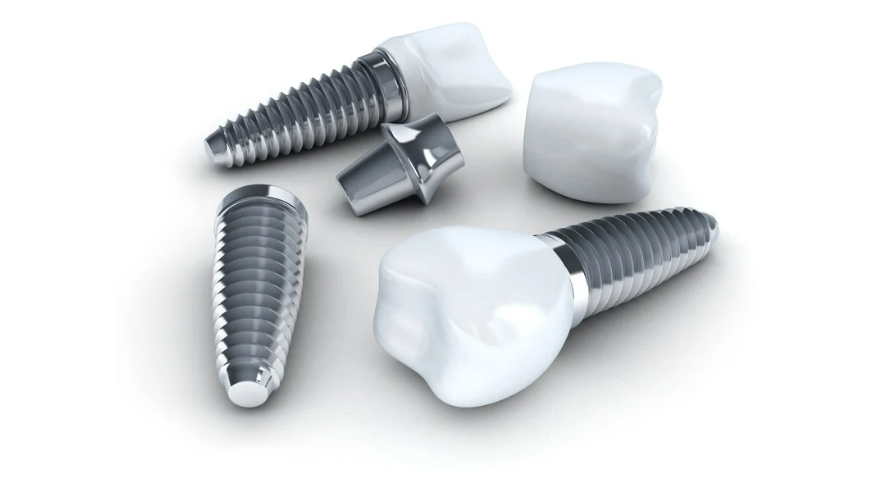The Ultimate Guide to Dental Implants: Everything You Need to Know About the Procedure
- 10 January 2023

Dental implants are a popular solution for people looking to replace missing teeth, improve their smile, and boost their oral health. They are artificial teeth roots that provide a permanent base for fixed or removable replacement teeth. If you're considering dental implants, it's essential to understand the procedure, its benefits, and any potential drawbacks. In this article, we'll explore everything you need to know about dental implants, from the types of implants to the cost and aftercare.
There are two main types of dental implants: endosteal and subperiosteal. Endosteal implants are the most common and are placed directly into the jawbone. They are typically made of titanium and take several months to fuse with the bone, after which the dentist attaches a post to the implant, which serves as the anchor for the replacement tooth. Subperiosteal implants, on the other hand, are placed on top of the jawbone and under the gum tissue. They are suitable for individuals who have insufficient jawbone height or density, making them an excellent alternative to bone grafting or sinus lifts.
The dental implant procedure is typically performed under local or general anesthesia and involves several stages, including:
- Consultation and planning: The dentist will evaluate your dental health, take x-rays and impressions, and create a treatment plan that fits your individual needs.
- Placement of the implant: The dentist will make a small incision in the gum and place the implant into the jawbone. The implant will be left to heal for several months, during which time the bone will fuse to the implant.
- Attachment of the abutment: Once the implant has fused with the bone, the dentist will attach an abutment, which serves as the base for the replacement tooth.
- Placement of the replacement tooth: The final step is to attach the replacement tooth, which can be a crown, bridge, or denture, to the abutment.
One of the main benefits of dental implants is their durability and longevity. With proper care, they can last a lifetime, making them a cost-effective solution for replacing missing teeth. Additionally, dental implants mimic the look, feel, and function of natural teeth, allowing patients to enjoy a beautiful and functional smile. They also help to preserve jawbone structure, prevent the shifting of surrounding teeth, and improve oral health by eliminating the need for a removable denture or bridge.
While dental implants are a safe and effective solution for many people, there are some potential drawbacks to consider. Some individuals may experience implant failure due to insufficient jawbone density or improper placement. Additionally, the cost of dental implants can be substantial, with the average cost ranging from $3,000 to $5,000 or more. Insurance coverage for dental implants can vary, so it's essential to check with your insurance provider to see what is covered.
Aftercare is an important aspect of maintaining the longevity and health of your dental implants. Regular dental check-ups and cleanings are necessary to ensure the implants are functioning correctly and to prevent the development of gum disease. Good oral hygiene practices, such as brushing and flossing, are also essential to keep the implants and surrounding teeth healthy.
Points of Dental Implants: the types of implants, the procedure, benefits, drawbacks, and aftercare
When it comes to the types of dental implants, there are several options to choose from, including endosteal and subperiosteal implants. Endosteal implants are placed directly into the jawbone and are the most common type of implant. They are made of titanium and fuse with the bone over several months. Subperiosteal implants, on the other hand, are placed on top of the jawbone and under the gum tissue and are suitable for individuals with insufficient jawbone height or density.
The procedure for dental implants typically involves several stages, including consultation and planning, placement of the implant, attachment of the abutment, and placement of the replacement tooth. The procedure is performed under local or general anesthesia and is typically performed over several months to allow for proper healing and fusion of the implant with the jawbone.
One of the main benefits of dental implants is their durability and longevity. They can last a lifetime with proper care and can provide a cost-effective solution for missing teeth. Additionally, dental implants provide a natural-looking and functioning replacement for missing teeth and can improve oral health by preserving jawbone structure, preventing shifting of surrounding teeth, and eliminating the need for removable dentures or bridges.
Despite their benefits, dental implants also have some potential drawbacks, including implant failure due to insufficient jawbone density or improper placement and the high cost of the procedure, which can range from $3,000 to $5,000 or more. Additionally, insurance coverage for dental implants can vary, so it's essential to check with your insurance provider to see what is covered.
To ensure the longevity and health of your dental implants, proper aftercare is necessary. This includes regular dental check-ups and cleanings, good oral hygiene practices, such as brushing and flossing, and avoiding habits that can damage the implants, such as biting on hard objects or using tobacco.
In summary, dental implants are a highly effective solution for missing teeth and can provide long-lasting benefits for oral health and self-esteem. It's essential to consider the types of implants, the procedure, benefits, drawbacks, and aftercare before making a decision. Consult with your dentist to determine if dental implants are the right solution for you.




